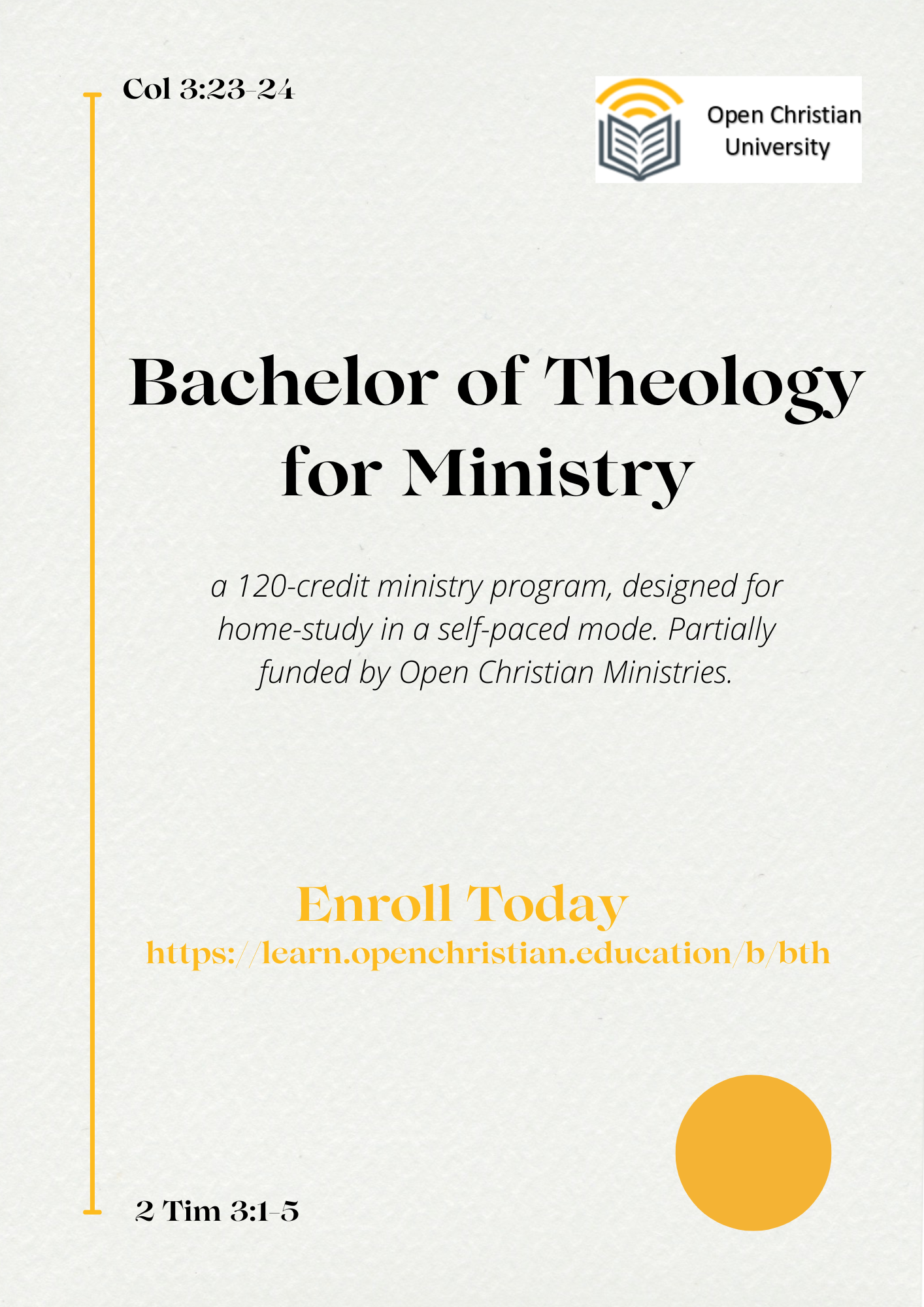Bachelor of Theology for Ministry
a 120-credit ministry program, designed for home-study in a self-paced mode. Partially funded by Open Christian Ministries.

a 120-credit ministry program, designed for home-study in a self-paced mode. Partially funded by Open Christian Ministries.
Upon the successful completion of the bachelor’s degree in theology program, the students should be able to:
This program is a 120-semester credits undergraduate undertaking, structured as follows:
Foundation of Faith:
Ten compulsory modules of 30 credits providing an ideal starting point for students who desire to know God’s Word and need a basic Biblical foundation for Spirit-filled Ministry. Students who successfully complete 30-credits are eligible for a Graduate Certificate in Theology.
Fundamental Courses
Ten modules of 40 credits that provide the best ministry preparation. Upon completion of these modules, students will be able to integrate Christian principles into critical thinking and decision-making. The program prepares the student for further study in the various specialization tracks of our Bachelor’s Degree. Students who successfully complete 30 credits (after the foundation track) are eligible for an Associate Degree.
Specialization Courses:
Ten ministry specialization modules of 40 credits, aligned with the student’s mission. Students who successfully reach this stage are now eligible for a Bachelor of Theology for Ministry.
Most students may envision a lead pastor preaching every Sunday in front of the congregation in a church. While working in a church is one facet of ministry, it’s certainly not the only one. The course opens up your eyes to look at how ministry can take place wherever you are and here are some jobs you can pursue with a ministry degree: Lead Pastor, Youth Pastor, Children’s Pastor, Pastor of Visitation, Worship Director, Christian Teacher, Camp Coordinator, Spiritual Coach, Devotional Writer, Spiritual Care Coordinator, Bereavement Coordinator, Chaplain, Missionary, Counselor or Marketplace minister.
Applicants for admission must have completed high school studies or equivalent from a from a recognized institution.
The curriculum emphasizes demonstration, training laymen to be participators rather than spectators. Intellectual knowledge of God is not enough: But be ye doers of the Word, and not hearers only, deceiving your own selves (James 1:22). Participants are therefore taken beyond teaching to training where participation is required to challenge students with spiritual reproduction. True knowledge is gained only by experience. Study results in gaining information, but not experience. Teaching is factual while training is experiential. Jesus is a living person, not merely a fact. Relationship to Him is based on experience, not just knowledge, facts, and information. The aim of the training is not accumulated knowledge, but the action which converts the possibilities of ministry into reality. It is not just articulation [talking about the power of God], but demonstration [putting it into action]: “And my speech and my preaching was not with enticing words of man's wisdom, but in demonstration of the Spirit and of power; that your faith should not stand in the wisdom of men, but in the power of God”(I Corinthians 2:4-5).
We stress training rather than teaching. Although teaching is part of training, teaching leaves the learner the option to accept what is taught or reject it. We desire that students “...mightest know the certainty of those things, wherein thou has been instructed”(Luke 1:4). The curriculum takes students beyond teaching to training where participation is required. The participation to which students are challenged is that of spiritual reproduction. Christ's first appeal to His disciples was centered on reproduction: “And He saith unto them, Follow me, and I will make you fishers of men” (Matthew 4:19).
His final command was to reproduce spiritually: “Go ye therefore, and teach all nations, baptizing them in the name of the Father, and of the Son, and of the Holy Ghost; Teaching them to observe all things whatsoever I have commanded you…” (Matthew 28:19-20)
The Church is a spiritual body under commission. Since 99% of the Church is composed of laymen, this force must be motivated to become reproductive in order to harvest the spiritual fields of the nations of the world.
Through the application of Scriptural principles, this training results in each believer having the potential to raise up other motivated Christians, creating a new network of evangelism throughout the world. Even if they never teach a Sunday school class, preach a sermon, or minister in a group situation, each believer can become part of the expansion of this evangelistic network.
This is not a plan developed by an individual or an organization, but the plan of God revealed in the Scriptures. It is based on the principle given by the Apostle Paul to a young minister named Timothy: “And the things that thou has heard of me among many witnesses, the same commit thou to faithful men, who shall be able to teach others also” (II Timothy 2:2).
Progression: For complete intensified training to move laymen from vision to reality, use the courses in the order explained in the "Curriculum" file. Each module and course is independent of all others, however, permitting a course to be used separately if so desired. For example, a pastor can use "Foundations of Faith" in a class for new converts without ordering other courses offered by the Institute

